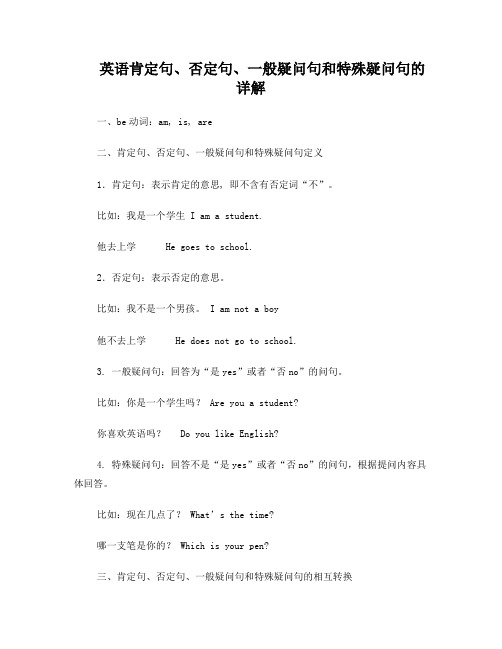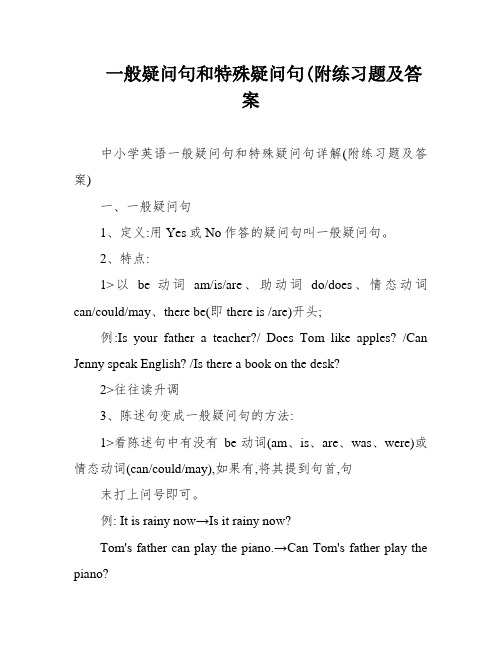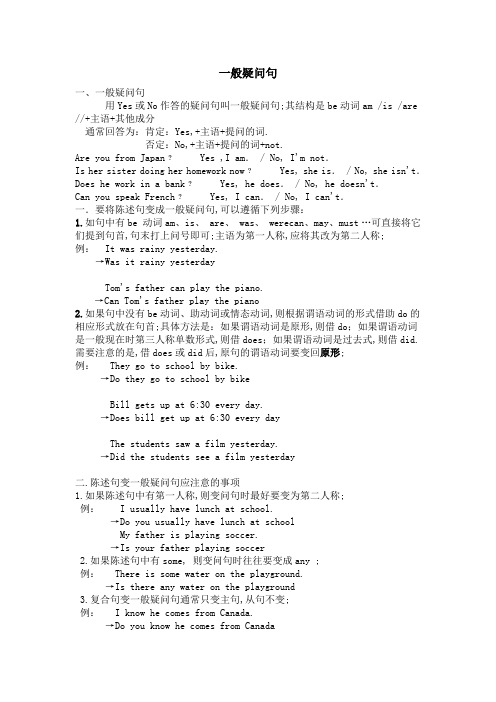一般疑问句和特殊疑问句-讲解及练习
(完整版)英语一般疑问句和特殊疑问句的讲解及练习

一般疑问句用be动词(am /is主语+其他成分,+主语+提问的词.否定:No,+主语+提问的词+not.Are you from Japan﹖Yes ,I am./ No, I'm not.Is her sister doing her homework now﹖Yes, she is./ No, she isn't.Does he work in a bank﹖Yes, he does./ No, he doesn't.Can you speak French﹖Yes, I can./ No, I can't.一: 般疑问句还有下列特点:1、以be动词、助动词或情态动词开头;例:Is your father a teacher? Does Catherine like animals? Can Jenny speak French?二: 如何将陈述句变成一般疑问句?1.如句中有be 动词(am、is、are、was、were can、may、must …)或助动词(do、does、did、have、had(完成时中))时,可直接将它们提到句首,句末打上问号即可。
主语为第一人称,应将其改为第二人称。
例:It was rainy yesterday.→Was it rainy yesterday?Tom's father can play the piano.→Can Tom's father play the piano?I have finished my homework.→Have you finished your homework?2.如果句中没有be动词、助动词或情态动词,则根据谓语动词的形式借助do的相应形式放在句首。
具体方法是:如果谓语动词是原形,则借do;如果谓语动词是一般现在时第三人称单数形式,则借does;如果谓语动词是过去式,则借did. 需要注意的是,借does或did后,原句的谓语动词要变回原形。
(完整版)英语一般疑问句和特殊疑问句的讲解及练习(最新整理)

一般疑问句用Yes 或No 作答的疑问句叫一般疑问句。
其结构是be 动词(am /is /are ) /助动词/情态动词+主语+其他成分通常回答为:肯定:Yes,+主语+提问的词.否定:No,+主语+提问的词+not.Are you from Japan﹖Yes ,I am./ No, I'm not.Is her sister doing her homework now﹖Yes, she is./ No, sheisn't.Does he work in a bank﹖Yes, he does./ No, he doesn't.Can you speak French﹖Yes, I can./ No, I can't.一: 般疑问句还有下列特点:1、以be 动词、助动词或情态动词开头;例:Is your father a teacher? Does Catherine like animals? Can Jenny speak French?二: 如何将陈述句变成一般疑问句?要将陈述句变成一般疑问句,可以遵循下列步骤:1.如句中有be 动词(am、is、are、was、were)情态动词(can、may、must …)或助动词(do、does、did、 have、had(完成时中))时,可直接将它们提到句首,句末打上问号即可。
主语为第一人称,应将其改为第二人称。
例:It was rainy yesterday.→Was it rainy yesterday?Tom's father can play the piano.→Can Tom's father play the piano?I have finished my homework.→Have you finished your homework?2.如果句中没有be 动词、助动词或情态动词,则根据谓语动词的形式借助do 的相应形式放在句首。
1月20日一般疑问句和特殊疑问句-讲解及练习

一般疑问句一、一般疑问句作答的疑问句叫一般疑问句。
其结构是be动词(am /is /are )主语+其他成分Yes,+主语+提问的词.否定:No,+主语+提问的词+not.Are you from Japan﹖Yes ,I am./ No, I'm not.Is her sister doing her homework now﹖Yes, she is./ No, she isn't.Does he work in a bank﹖Yes, he does./ No, he doesn't.Can you speak French﹖Yes, I can./ No, I can't.1.如句中有be 动词(am、is、are、was、were can、may、must …)可直接将它们提到句首,句末打上问号即可。
应将其改为第二人称。
例:It was rainy yesterday.→Was it rainy yesterday?Tom's father can play the piano.→Can Tom's father play the piano?2.如果句中没有be动词、助动词或情态动词,则根据谓语动词的形式借助do的相应形式放在句首。
具体方法是:如果谓语动词是原形,则借do;如果谓语动词是一般现在时第三人称单数形式,则借does;如果谓语动词是过去式,则借did. 需要注意的是,借does或did后,原句的谓语动词要变回原形。
例:They go to school by bike.→Do they go to school by bike?Bill gets up at 6:30 every day.→Does bill get up at 6:30 every day?The students saw a film yesterday.→Did the students see a film yesterday?二.陈述句变一般疑问句应注意的事项1.如果陈述句中有第一人称,则变问句时最好要变为第二人称。
小学英语一般疑问句和特殊疑问句(附练习题)

英语肯定句、否定句、一般疑问句和特殊疑问句的详解一、be动词:am, is, are二、肯定句、否定句、一般疑问句和特殊疑问句定义1.肯定句:表示肯定的意思, 即不含有否定词“不”。
比如:我是一个学生 I am a student.他去上学 He goes to school.2.否定句:表示否定的意思。
比如:我不是一个男孩。
I am not a boy他不去上学 He does not go to school.3. 一般疑问句:回答为“是yes”或者“否no”的问句。
比如:你是一个学生吗? Are you a student?你喜欢英语吗? Do you like English?4. 特殊疑问句:回答不是“是yes”或者“否no”的问句,根据提问内容具体回答。
比如:现在几点了?What’s the time?哪一支笔是你的? Which is your pen?三、肯定句、否定句、一般疑问句和特殊疑问句的相互转换有am, is, are的句子,肯定句变否定句:在am, is, are后面加上not,其余按顺序照抄。
肯定句变一般疑问句:把am, is, are提前放到句首并大写Am, Is, Are,其余照抄。
肯定句变特殊疑问句(就划线部分提问):分3步骤第一步:先变一般疑问句第二步:找合适的特殊疑问词代替划线部分第三步:特殊疑问词提前放到句首,并大写,其余按顺序照抄,省略划线部分。
注意:1.一定先变一般疑问句。
但是,如果问的是主语或主语的定语时,语序不变,为"特殊疑问词(+主语)+陈述句"。
如:Li ming 's not here today. Who's not here today? 今天谁没来?2.划线部分不能在特殊疑问句中出现。
when 什么时间(问时间)what date 什么日期问具体日期who 谁(问人)what place什么地点问具体地址whose 谁的问主人how …怎么样问情况where 在哪里问地点how old 多大问年龄which 哪一个问选择how many 多少问数量例如:1.肯定句、否定句和一般疑问句的互换肯定句:This is a book.否定句:This is not a book.一般疑问句:Is this a book?肯定回答:Yes, it is.否定回答:No, it isn’t.2.就划线部分提问(变特殊疑问句)This is a book.第一步:变一般疑问句 Is this a book?第二步:找合适的特殊疑问词 Is this what ?第三步:特殊疑问词提前放到句首,并大写,其余按顺序照抄,省略划线部分。
一般疑问句和特殊疑问句 (附练习题及答案

How do you go home?
On foot.
how old
多大
问年龄
How old is he?
6 years old.
how many
多少
问数量
How many books are there in the bookcase?
There are 10.
how much
多少
问价钱
How much is the book?
9. Mrs. Li and Kitty watch television at night.
Do Mrs. Li and Kitty watch television at night? Yes, they do. / No, they don’t.
10. I can finish my homework by myself.
中小学英语一般疑问句和特殊疑问句详解(附练习题及答案)
一、一般疑问句
1、定义:用Yes或No作答的疑问句叫一般疑问句。
2、特点:
1>以be动词am/is/are、助动词do/does、情态动词can/could/may、there be(即there is /are)开头;
例:Is your father a teacher?/ Does Tom like apples? /Can Jenny speak English? /Is there a book on the desk?
There is a book on the desk.→Is there a book on the desk?
2>如果句中没有be动词或情态动词,句首加do的相应形式(do、does、did),且原句的谓语动词要变回原形。
一般疑问句和特殊疑问句讲解及练习

一般疑问句在英语的学习中,一般疑问句的变换及回答是经常碰到的问题,现在我们就来商议一下有关一般疑问句的问题。
一、什么是一般疑问句用 Yes 或 No 作答的疑问句叫一般疑问句。
一般疑问句还有以下特点:1、以 be 动词、助动词或神情动词开头;例:Is your father a teacher? Does Catherine like animals? Can Jenny speak French?2、经常读升调;3、译成汉语,都能够带上“吗”,比方上面三句可分别译为:你父亲是老师吗?凯瑟琳喜欢动物吗?詹妮会说法语吗?二、例何将陈述句变成一般疑问句?要将陈述句变成一般疑问句,能够依照以下步骤:1.看句中有没有 be 动词( am、is、 are、 was、 were)、助动词( do、does、did、 have、had)或神情动词( can、must、will 、may 等),若是有,将其提到句首,句末打上问号即可。
例: It was rainy yesterday.→ Was it rainy yesterday?Tom's father can play the piano.→ Can Tom's father play the piano?I have finished my homework.→ Have you finished your homework?2.若是句中没有be 动词、助动词或神情动词,则依照谓语动词的形式借助do 的相应形式放在句首。
详尽方法是:若是谓语动词是原形,则借do;若是谓语动词是一般现在时第三人称单数形式,则借 does;若是谓语动词是过去式,则借did.需要注意的是,借does 或 did 后,原句的谓语动词要变回原形。
例: They go to school by bike.→ Do they go to school by bike?Bill gets up at 6:30 every day.→ Does bill gets up at 6:30 every day?The students saw a film yesterday.→Did the students see a film yesterday?三.陈述句变一般疑问句应注意的事项陈述句变成一般疑问句除了依照上述规则以外,还应注意以下几点:1.若是陈述句中有第一人称,则变问句时最好要变成第二人称。
日一般疑问句和特殊疑问句讲解及练习完整版

日一般疑问句和特殊疑问句讲解及练习集团标准化办公室:[VV986T-J682P28-JP266L8-68PNN]一般疑问句一、一般疑问句用Yes或No作答的疑问句叫一般疑问句。
其结构是be动词(am/is/are)//+主语+其他成分通常回答为:肯定:Yes,+主语+提问的词.否定:No,+主语+提问的词+not.AreyoufromJapan﹖Yes,Iam./No,I'mnot.Ishersisterdoingherhomeworknow﹖Yes,sheis./No,sheisn't.Doesheworkinabank﹖Yes,hedoes./No,hedoesn't.CanyouspeakFrench﹖Yes,Ican./No,Ican't.一.要将陈述句变成一般疑问句,可以遵循下列步骤:1.如句中有be动词(am、is、are、was、were)(can、may、must…)可直接将它们提到句首,句末打上问号即可。
主语为第一人称,应将其改为第二人称。
例:Itwasrainyyesterday.→Wasitrainyyesterday?Tom'sfathercanplaythepiano.→CanTom'sfatherplaythepiano?2.如果句中没有be动词、助动词或情态动词,则根据谓语动词的形式借助do 的相应形式放在句首。
具体方法是:如果谓语动词是原形,则借do;如果谓语动词是一般现在时第三人称单数形式,则借does;如果谓语动词是过去式,则借did.需要注意的是,借does或did后,原句的谓语动词要变回原形。
例:Theygotoschoolbybike.→Dotheygotoschoolbybike?Billgetsupat6:30everyday.→Doesbillgetupat6:30everyday?Thestudentssawafilmyesterday.→Didthestudentsseeafilmyesterday?二.陈述句变一般疑问句应注意的事项1.如果陈述句中有第一人称,则变问句时最好要变为第二人称。
英语一般疑问句和特殊疑问句的讲解及练习

一般疑问句用be动词(am /is主语+其他成分,+主语+提问的词.否定:No,+主语+提问的词+not.Are you from Japan﹖Yes ,I am./ No, I'm not.Is her sister doing her homework now﹖Yes, she is./ No, she isn't.Does he work in a bank﹖Yes, he does./ No, he doesn't.Can you speak French﹖Yes, I can./ No, I can't.一: 般疑问句还有下列特点:1、以be动词、助动词或情态动词开头;例:Is your father a teacher? Does Catherine like animals? Can Jenny speak French?二: 如何将陈述句变成一般疑问句?1.如句中有be 动词(am、is、are、was、were can、may、must …)或助动词(do、does、did、have、had(完成时中))时,可直接将它们提到句首,句末打上问号即可。
主语为第一人称,应将其改为第二人称。
例:It was rainy yesterday.→Was it rainy yesterday?Tom's father can play the piano.→Can Tom's father play the piano?I have finished my homework.→Have you finished your homework?2.如果句中没有be动词、助动词或情态动词,则根据谓语动词的形式借助do的相应形式放在句首。
具体方法是:如果谓语动词是原形,则借do;如果谓语动词是一般现在时第三人称单数形式,则借does;如果谓语动词是过去式,则借did. 需要注意的是,借does或did后,原句的谓语动词要变回原形。
英语一般疑问句和特殊疑问句的讲解及练习

一般疑问句用Yes be动词(am /is主语+其他成分主语+提问的词.否定:No,+主语+提问的词+not.Are you from Japan﹖Yes ,I am. / No, I'm not.Is her sister doing her homework now﹖Yes, she is. / No, she isn't.Does he work in a bank﹖Yes, he does. / No, he doesn't.Can you speak French﹖Yes, I can. / No, I can't.一: 般疑问句还有下列特点:1、以be动词、助动词或情态动词开头;例:Is your father a teacher? Does Catherine like animals? Can Jenny speak French?二: 如何将陈述句变成一般疑问句?要将陈述句变成一般疑问句,可以遵循下列步骤:1.如句中有be 动词(am、is、 are、 was、 were can、may、must …)或助动词(do、does、did、 have、 had(完成时中))时,可直接将它们提到句首,句末打上问号即可。
主语为第一人称,应将其改为第二人称。
例: It was rainy yesterday.→Was it rainy yesterday?Tom's father can play the piano.→Can Tom's father play the piano?I have finished my homework.→Have you finished your homework?2.如果句中没有be动词、助动词或情态动词,则根据谓语动词的形式借助do的相应形式放在句首。
具体方法是:如果谓语动词是原形,则借do;如果谓语动词是一般现在时第三人称单数形式,则借does;如果谓语动词是过去式,则借did. 需要注意的是,借does 或did后,原句的谓语动词要变回原形。
初中英语一般疑问句和特殊疑问句讲解及练习

初中英语一般疑问句和特殊疑问句知识一般疑问句1.定义:用be或助动词或情态动词置于句首,并以“Yes,…”,或“No,…”或相当于yes / no回答的问句称为一般疑问句.2. 含系动词be的一般疑问句的构成:具体地说,am 只能跟在第一人称的单数I 后面,are 搭配you, 不管是单数还是复数,is跟在第三人称单数he, she 后面Eg:I'm in Class 2, Grade 1. →Are you in Class 2, Grade 1? (如遇第一人称,最好将其置换成第二人称)It's a map of China. →Is it a map of China? 这是一幅中国地图吗?be 或have(有)置于句首来表达疑问,eg:Am I wrong again? (我又错了?)3. 含情态动词的一般疑问句的构成一般疑问句面前人人平等:情态动词与am / is / are一样,也可直接将它们提至主语前,所以问题迎刃而解了。
如:I can spell it. →Can you spell it? 你会拼写它吗?Shall I call a taxi for you ?Will you do that for her?Can she drive?4. 含实义动词的一般疑问句的构成含实义动词的一般疑问句的构成稍微有点讲究,要在句首加助动词do或者does(当主语为第三人称单数,并要将谓语动词变回原形),有时陈述句中的some还要变作any等。
如:She lives in Beijing. →Does she live in Beijing?I like English. →Do you like English?There are some books on my desk.→Are there any books on your desk?5. 一般疑问句的应答用yes / no回答,并怎么问怎么答(句首为情态动词/am / is / are还是do /does),简略回答时要注意缩写(否定的n't)和采用相应的人称代词以避免重复:即"Yes,主语(代词)+情态动词或am / is / are或do / does."表示肯定;"No,主语(代词)+情态动词或am / is / are或者do / does not(n't)."表示否定。
小学英语一般疑问句和特殊疑问句(附练习题)

小学英语一般疑问句和特殊疑问句(附练习题)一、一般疑问句一般疑问句是需要用Yes或No作答的疑问句。
它的特点是以be动词、助动词或情态动词开头,并且往往读升调。
要将陈述句变成一般疑问句,有两种方法。
如果陈述句中有be动词或情态动词,就将它们提到句首,句末加上问号即可。
如果句中没有这些动词,就在句首加上do的相应形式,并将原句的谓语动词变回原形。
需要注意的是,如果陈述句中有第一人称,变成疑问句时要变为第二人称。
而如果陈述句中有some,变成疑问句时往往要变成any。
回答一般疑问句时,如果问句主语是this或that,就用it代替;如果问句主语是these或those,就用they代替。
例如,如果问句是“Does she clean her room every day?”,回答可以是“Yes。
she does.”如果问句是“Is this your book?”,回答可以是“Yes。
it is.”1._______ is your favorite color?2._______ did you go on n?3._______ is your birthday?4._______ is your best friend?答案:1.What2.Where3.When4.Who二、改写句子1.His XXX.What was his father's job?2.XXX.Why are these cats crying?3.They can swim.What can they do?4.I went to school on foot.How did you go to school?5.His father goes to work by bus.How does his father go to work?6.Mrs。
Li and Kitty XXX.What can Mrs。
Li and Kitty do?7.Kitty is XXX.What is Kitty wearing?8.The two boys under the tree were hungry. Who was hungry under the tree?9.Mrs。
一般疑问句和特殊疑问句(附练习题及答案

一般疑问句和特殊疑问句(附练习题及答案中小学英语一般疑问句和特殊疑问句详解(附练习题及答案)一、一般疑问句1、定义:用Yes或No作答的疑问句叫一般疑问句。
2、特点:1>以be动词am/is/are、助动词do/does、情态动词can/could/may、there be(即there is /are)开头;例:Is your father a teacher?/ Does Tom like apples? /Can Jenny speak English? /Is there a book on the desk?2>往往读升调3、陈述句变成一般疑问句的方法:1>看陈述句中有没有be动词(am、is、are、was、were)或情态动词(can/could/may),如果有,将其提到句首,句末打上问号即可。
例: It is rainy now→Is it rainy now?Tom's father can play the piano.→Can Tom's father play the piano?There is a book on the desk.→Is th ere a book on the desk?2>如果句中没有be动词或情态动词,句首加do的相应形式(do、does、did),且原句的谓语动词要变回原形。
1.They go to school by bike.→Do they go to school by bike?2.Bill gets up at 6:30 every day.→Does bill gets up at 6:30 every day?3.The students saw a film yesterday.→Did the students see a film yesterday?注: 1)如果陈述句中有第一人称,则变问句时要变为第二人称。
完整版英语一般疑问句和特殊疑问句的讲解及练习

一般疑问句用Yes或No作答的疑问句叫一般疑问句。
其结构是be动词(am /is/are ) /助动词/情态动词+主语+其他成分通常回答为:肯定:Yes,+主语+提问的词.否定:No,+主语+提问的词+not.Are you from Japan﹖Yes ,I am./ No, I'm not.Is her sister doing her homework now﹖Yes, she is./ No, sheisn't.Does he work in a bank﹖Yes, he does./ No, he doesn't.Can you speak French﹖Yes, I can./ No, I can't.一: 般疑问句还有下列特点:1、以be动词、助动词或情态动词开头;例:Is your father a teacher? Does Catherine like animals? Can Jenny speak French?二: 如何将陈述句变成一般疑问句?要将陈述句变成一般疑问句,可以遵循下列步骤:1.如句中有be 动词(am、is、are、was、were)情态动词(can、may、must …)或助动词(do、does、did、have、had(完成时中))时,可直接将它们提到句首,句末打上问号即可。
主语为第一人称,应将其改为第二人称。
例:It was rainy yesterday.→Was it rainy yesterday?Tom's father can play the piano.→Can Tom's father play the piano?I have finished my homework.→Have you finished your homework?2.如果句中没有be动词、助动词或情态动词,则根据谓语动词的形式借助do的相应形式放在句首。
日一般疑问句和特殊疑问句讲解及练习

一般疑问句一、一般疑问句用Yes或No作答的疑问句叫一般疑问句;其结构是be动词am /is /are //+主语+其他成分通常回答为:肯定:Yes,+主语+提问的词.否定:No,+主语+提问的词+not.Are you from Japan﹖Yes ,I am. / No, I'm not.Is her sister doing her homework now﹖Yes, she is. / No, she isn't.Does he work in a bank﹖Yes, he does. / No, he doesn't.Can you speak French﹖Yes, I can. / No, I can't.一.要将陈述句变成一般疑问句,可以遵循下列步骤:1.如句中有be 动词am、is、 are、 was、 werecan、may、must …可直接将它们提到句首,句末打上问号即可;主语为第一人称,应将其改为第二人称; 例: It was rainy yesterday.→Was it rainy yesterdayTom's father can play the piano.→Can Tom's father play the piano2.如果句中没有be动词、助动词或情态动词,则根据谓语动词的形式借助do的相应形式放在句首;具体方法是:如果谓语动词是原形,则借do;如果谓语动词是一般现在时第三人称单数形式,则借does;如果谓语动词是过去式,则借did. 需要注意的是,借does或did后,原句的谓语动词要变回原形;例: They go to school by bike.→Do they go to school by bikeBill gets up at 6:30 every day.→Does bill get up at 6:30 every dayThe students saw a film yesterday.→Did the students see a film yesterday二.陈述句变一般疑问句应注意的事项1.如果陈述句中有第一人称,则变问句时最好要变为第二人称;例: I usually have lunch at school.→Do you usually have lunch at schoolMy father is playing soccer.→Is your father playing soccer2.如果陈述句中有some, 则变问句时往往要变成any ;例: There is some water on the playground.→Is there any water on the playground3.复合句变一般疑问句通常只变主句,从句不变;例: I know he comes from Canada.→Do you know he comes from Canada4.如果句中含实义动词have且表示“有”时,除借do外,也可将其直接提到句首;例: I have some friends in America.→Have you any friends in America /Do you have any friends in America三.一般疑问句的回答1.第一个词:不是Yes就是No;有时根据语气的不同,Yes可由Sure, Certainly, Of course等代替.NO可由sorry 代替.2.第二个词:问谁答谁;即答语中的主语须与问句的主语一致必须用主格代词;例:Does she clean her room every dayYes, she does.Is Anna′s father a doctor No, he isn′t.如果主语是 this that,回答时用 it 代替;Is this your penYes, it is. No, it isn't.如果问句中主语these, those,回答时用 they 代替;Are those your booksYes, they are. No, they aren't.3.第三个词:用什么问,用什么答;即用问句中的提问词;Can Jim play soccer Yes, he can.Does Mr Bean speak EnglishYes, he does.需注意问题:用 may 引导的问句,肯定回答用may,否定回答用can′t 或mustn′t,用 must 引导的问句,肯定回答用 must,否定回答用needn′t/don’t have to例:May I go to the park now Yes, you may. /No, you mustn′t.Must I wash my clothes now Yes, you must. /No, you needn′t. 4.作否定回答时,结尾要加上not;否定回答最好缩写,而肯定回答不能缩写;例:Did Thomas come here yesterday Yes, he did./ No ,he didn′t.Is Lin Lin in Class 3 Yes, she is. / No, she isn′t.特殊疑问句以疑问词开头,对句中某一成分提问的句子叫特殊疑问句;常用的疑问词有:what什么, who谁, whose谁的, which哪个, when何时, where哪里, how怎样,通过..., why为何等;特殊疑问句有两种语序:1.如疑问词作主语或主语的定语,即对主语或主语的定语提问,其语序是陈述句的语序:疑问词+主语+谓语动词+其他成分如:who is singing in the room﹖whose bike is broken﹖2.如疑问词作其他成分,即对其他成分提问,其语序是:疑问词+一般疑问句语序如:what class are you in﹖What does she look like﹖Where are you from﹖What time does he get up every morning﹖How do you know﹖注意:1.回答特殊疑问句时,不能用yes / no,即问什么答什么,尤其是简略回答;如:Who is from Canada﹖Helen is.Where's the restaurant﹖Near the station.Why do you like koalas﹖Because they are cute.一、陈述句变一般疑问句1. His father is an English teacher.___________________________________________2. These cats are crying.喊叫___________________________________________3. They can swim.___________________________________________4. I like to read阅读 English.___________________________________________5. I go to school on foot.走路___________________________________________6. The children had a good time in the park公园.___________________________________________7. His father goes to work by bus.乘公共汽车___________________________________________8. The boy under the tree树 is hungry.饥饿___________________________________________9. He goes to school every day.___________________________________________10. I want to have a model car摩托车.___________________________________________11. Mrs. Li and Kitty watch TV at night在晚上.___________________________________________12 The boy does some housework家庭作业 at home.___________________________________________二、把肯定句变为否定句1. His father is an English teacher.____________________________________________.2. These cats are crying.喊叫____________________________________________.3. They can swim.____________________________________________.4. His father goes to work by bus.乘公共汽车_______________________________________________ .5. Tom has some apples.___________________________________________ .6. The children had a good time in the park公园.___________________________________________ .7. Mrs. Li and Kitty watch TV at night在晚上.___________________________________________ .8. The boy does some housework家庭作业 at home.___________________________________________ .三、作肯定和否定回答1、Is this your pencil-case肯定回答:___________________. 否定回答:___________________.2、Is that his backpack肯定回答:___________________. 否定回答:___________________.3、Are these her brothers肯定回答:___________________. 否定回答:___________________.4、Are those Tom’s parents肯定回答:___________________. 否定回答:___________________.5、Can you play the guitar肯定回答:___________________. 否定回答:___________________.6、Do they like French fries肯定回答:___________________. 否定回答:___________________.7、Does he like pears肯定回答:___________________. 否定回答:___________________.8、May I ask your question肯定回答:___________________. 否定回答:___________________.9、Is he your father肯定回答:___________________. 否定回答:___________________.10、Are you from China.肯定回答:___________________. 否定回答:___________________.特殊疑问句习题: 就划线部分提问1.They bought a new bike yesterday.____________________________________________________2.She is my teacher. ___________________________________3. It is my coat . ______________________________________4. I am looking for my sister .____________________________________________________5. I get up at six .____________________________________________________6. I am from Hubei .__________________________________________________7. I went to school late because I got up late.____________________________________________________8. I am getting on well with it.____________________________________________________9. My bag is red ._______________________________________10. They are five yuan .______________________________________________________11. I wash it twice a week .______________________________________________________12. He will be back in four days ._一般将来时一、单项选择1. If they come, we ________ a meeting.A. haveB. will haveC. hadD. would have2. He ________ her a beautiful hat on her next birthday.A. givesB. gaveC. will givingD. is going to give3. He ________ to us as soon as he gets there.A. writesB. has writtenC. will writeD. wrote4. – Will his parents go to see the Terra Cotta Warriors tomorrow– No, ________ 不去.A. they willn’tB. they won’t.C. they aren’tD. they don’t.5. Who ________ we ________ swimming with tomorrow afternoonA. will; goB. do; goC. will; goingD. shall; go6. We ________ the work this way next time.A. doB. will doC. going to doD. will doing7. Tomorrow he ________ a kite in the open air first, and then ________ boating in the park.A. will fly; will go B. will fly; goesC. is going to fly; will goesD. flies; will go8. The day after tomorrow they ________ a volleyball match.A. will watchingB. watchesC. is watchingD. is going to watch9. There ________ a birthday party this Sunday.A. shall be B. willbe C. shall going to be D. will going to be10. They ________ an English evening next Sunday.A. are havingB. are going to haveC. will havingD. is going to have11. He ________ there at ten tomorrow morning.A. will B. is C. will be D.be12. It ________ the year of the horse next year.A. is going to beB. is going toC. will beD. will is13. ________ open the windowA. Will you pleaseB. Please will youC. You pleaseD. Do you14. It ________ us a long time to learn English well.A. takesB. will takeC. spendsD. will spend15. The train ________ at 11.A. going to arrive B. will be arrive C. is going to D. is arriving二、用所给动词的一般将来时填空1. I ______leavein a minute. I ______finishall my work before I ______ leave.2. I am afraid there ___________bea meeting this afternoon. I can’t join you.3. I ___________betired. I ___________goto bed early tonight.4. Mary’s birthday is next Monday, her mother __________giveher a present.5. It is very cold these days. It ___________snowsoon.6. —__________ you __________behere this Saturday—No. I ___________visitmy teacher.7. —__________ I ________getyou a copy of today’s newspaper —Thank you.情态动词1.—Must we leave now—No, we _______.We still have two more hours.A. can’tB. mustn’tC. needn’tD. shouldn’t2. — Can you ride a horse— No. I____ .A. needn'tB. may notC. can'tD. mustn't3. You eat the soup if you don't like it.A. shouldn'tB. mustn'tC. needn'tD. can't4. _____ you wait a few more minutesIt'll be your turn soon,A. MustB. ShouldC. CouldD. Might5. She _______ be here . I saw her come in.A. canB. mayC. shouldD. must6. I can’t go to the cinema with you because I ___________ stay here until my mother comes back.A. canB. couldC. mayD. must7. —Be quiet, Mr. Smith is coming.—Don’t worry. It ___ be him. Mr. Smith is much taller.A. mustn’tB. mustC. can’t8.—Hey, Ted You _______ never play in the street. It’s not safe.—Sorry, Mum. I won’t again.A. needB. mustC. canD. may9.—How long may I keep the book—You ________ keep it for two weeks.A. mayB. mustC. will10.—May I smoke here,please—I am afraid you .This is a non-smoking area.A.can B.can’t C.may D.may not11.— Must I return the book this week— No, you ____. You can _ it for 20 days.A. mustn’t; keepB. needn't; borrowC. needn't; keepD. mustn't; borrow12. —Could I use your eraser for a while —Yes, of course you _.A.couldB. canC. willD. Should13—________ I watch TV now, Mom—No. It’s too late ,and you ______ go to bed.A. May; have toB. Will; shouldC. Can; willD. Must;need14.—Must I finish my homework today, Ms Liu—No,_______.A. you mustn’tB.you don’t have toC.you can’t15. According to the new traffic laws, people ______ drive after drinking wine or beer.A .wouldn’t B. couldn’t C. needn’t D. mustn’t16. —Who’s singing in the next room— It ____ be her . She has gone to New York.A. can’tB. mustC. shouldn’tD. can。
- 1、下载文档前请自行甄别文档内容的完整性,平台不提供额外的编辑、内容补充、找答案等附加服务。
- 2、"仅部分预览"的文档,不可在线预览部分如存在完整性等问题,可反馈申请退款(可完整预览的文档不适用该条件!)。
- 3、如文档侵犯您的权益,请联系客服反馈,我们会尽快为您处理(人工客服工作时间:9:00-18:30)。
一般疑问句在英语的学习中,一般疑问句的转换及回答是经常碰到的问题,现在我们就来探讨一下有关一般疑问句的问题。
一、什么是一般疑问句用Yes或No作答的疑问句叫一般疑问句。
一般疑问句还有下列特点:1、以be动词、助动词或情态动词开头;例:Is your father a teacher Does Catherine like animals Can Jenny speak French2、往往读升调;3、译成汉语,都可以带上“吗”,例如上面三句可分别译为:你父亲是老师吗凯瑟琳喜欢动物吗詹妮会说法语吗二、例何将陈述句变成一般疑问句要将陈述句变成一般疑问句,可以遵循下列步骤:1.看句中有没有be动词(am、is、are、was、were)、助动词(do、does、did、have、had)或情态动词(can、must、will、may等),如果有,将其提到句首,句末打上问号即可。
例:It was rainy yesterday.→Was it rainy yesterdayTom's father can play the piano.→Can Tom's father play the pianoI have finished my homework.→Have you finished your homework2.如果句中没有be动词、助动词或情态动词,则根据谓语动词的形式借助do的相应形式放在句首。
具体方法是:如果谓语动词是原形,则借do;如果谓语动词是一般现在时第三人称单数形式,则借does;如果谓语动词是过去式,则借did. 需要注意的是,借does 或did后,原句的谓语动词要变回原形。
例:They go to school by bike.→Do they go to school by bikeBill gets up at 6:30 every day.→Does bill gets up at 6:30 every dayThe students saw a film yesterday.→Did the stud ents see a film yesterday三.陈述句变一般疑问句应注意的事项陈述句变成一般疑问句除了遵循上述规则以外,还应注意下列几点:1.如果陈述句中有第一人称,则变问句时最好要变为第二人称。
例:I usually have lunch at school.→Do you usually have lunch at schoolMy father is playing soccer.→I s your father playing soccer2.如果陈述句中有some, 则变问句时往往要变成any 。
例:There is some water on the playground.→Is there any water on the playground3.复合句变一般疑问句通常只变主句,从句不变。
例:I know he comes from Canada.→Do you know he comes fr om Canada4.如果句中含有实义动词have且表示“有”时,除借do外,也可将其直接提到句首。
例:I have some friends in America.→Have you any friends in America/Do you have any friends in America四.一般疑问句的回答一般疑问句往往采用简短回答,共由三部分(三个单词)组成,对这三部分(三个单词)的确定可以概括例下:1.第一个词:不是Yes就是No。
(有时根据语气的不同,Yes可由Sure, Certainly, Of course 等代替.NO可由sorry 代替.)2.第二个词:问谁答谁。
即答语中的主语须与问句的主语一致(但必须用主格代词)。
例:Does she clean her room every day Yes, she does.Is Anna′s father a doctor No,he isn′t.如果主语是this that,回答时用it 代替,如果问句中主语these, those,回答时用they′ 代替。
3.第三个词:用什么问,用什么答。
即沿用问句中的引导词。
Can Jim play soccer Yes, he can./Does Mr Bean speak English Yes, he does. 需要注意问题:(1).用may 引导的问句,肯定回答用may,否定回答用can′t 或mustn′t,用must 引导的问句,肯定回答用must,否定回答用needn′t.例:May I go to the park now Yes, you may. /No, you mustn′t.Must I wash my clothes now Yes, you must. /No, you needn′t.4.用No开头作否定回答时,结尾要加上not。
因为回答必须是三部分,所以否定回答必须缩写,而肯定回答不能缩写。
例:Did Thomas come here yesterday Yes, he did./ No ,he didn′t.Is Lin Lin in C lass 3 Yes, she is. / No, she isn′t.或(No, she′s not).1. His father is an English teacher.2. These cats are crying.3. They can swim.4. I like to read English.5. I go to school on foot.6. He likes English.7. His father goes to work by bus.8. He is crying under the tree.9. His birthday is on the twentieth of November.10. Mrs. Li and Kitty are in a big shop.11. Kitty is wearing her new uniform.12. The boy under the tree is hungry.13. He goes to school every day.15. I want to have a model car.16. She wants a cup of coffee.17. Mrs. Li and Kitty watch television at night.18. I do my homework after school.特殊疑问句以疑问词开头,对句中某一成分提问的句子叫特殊疑问句。
常用的疑问词有:what who whose which when where how why等。
特殊疑问句有两种语序:1.如疑问词作主语或主语的定语,即对主语或主语的定语提问,其语序是陈述句的语序:疑问词(+主语)+谓语动词+其他成分如:who is singing in the room﹖whose bike is broken﹖2.如疑问词作其他成分,即对其他成分提问,其语序是:疑问词+一般疑问句语序如:what class are you in﹖What does she look like﹖Where are you from﹖What time does he get up every morning﹖How do you know﹖特殊疑问词+助动词+主语+动词原形+其他eg:Where do you do study English特殊疑问词+be动词+主语+其他eg:Why is your Mum so angry特殊疑问词+情态动词+主语+动词原形+其他eg:What can I do for you注意:1.回答特殊疑问句时,不能用yes /no,即问什么答什么,尤其是简略回答。
如:Who is from Canada﹖Helen (is).Where's the restaurant﹖Near the station.Why do you like koalas﹖Because they are cute.特殊疑问句练习题(一)一、选择正确的单词填空(who, where, when)is that pretty girl She is my sister. are Jack and Tom They are behind you.do you go to school I go to school from Monday to Friday.has a beautiful flower John has a beautiful flower.are they They are my parents. is my mother She is in the living room.are you going We are going to the bakery(面包坊).do Jim and Wendy play ball They play ball in the afternoon.does he jog He jogs in the park. are you from I'm from Changchun city.二、就画线部分提问is my father. are under the tree.often watch TV after dinner.(晚饭后) 提示:饭后强调的是时间问题。
swims in the swimming pool.(游泳池) flies in the sky.often brush my teeth in the evening. likes to play with Bill.'s father plays badminton(羽毛球) every weekend.supermarket is near the school. laptop(笔记本电脑) is on the table.has a pair of earrings(耳环). flowers are in the flower pot(花盆).grandpa took us to the zoo. put the gold fish(金鱼) into the fish tank(鱼缸). monkey sleeps at night.特殊疑问句练习(二)一.用what time, what color, what day, what填空。
